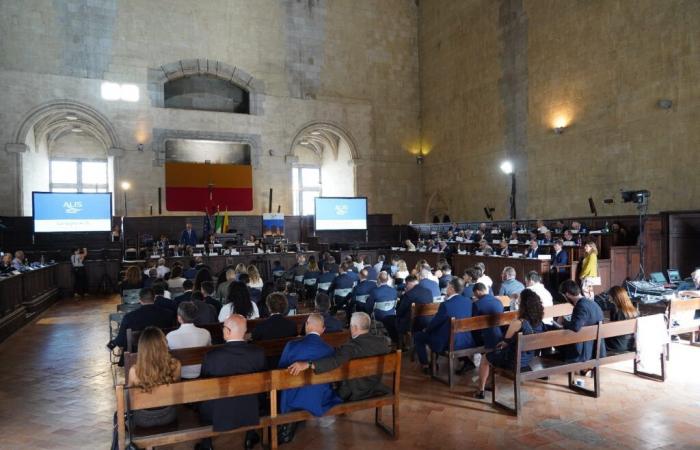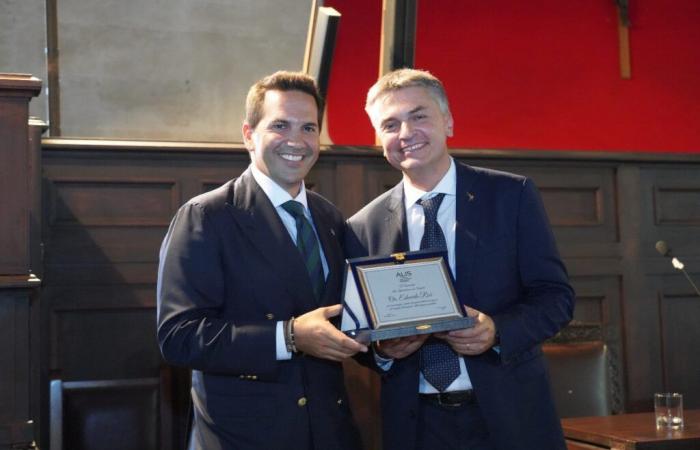“I am truly proud to have brought together the ALIS Board of Directors in the extraordinary Maschio Angioino castle, one of the symbols of Naples and one of our Italian wonders, in the presence of authoritative guests who accompanied us throughout the day with their speeches.
I particularly thank Edoardo Rixi, Deputy Minister of Infrastructure and Transport, Michele Di Bari, Prefect of Naples, Gaetano Manfredi, Mayor of Naples, Admiral Pietro Vella, Maritime Director of Campania and Commander of the Port Authority of Naples and Andrea Annunziata, President of the Port System Authority of the Central Tyrrhenian Sea.
I would also like to thank the important stakeholders who intervened to present new opportunities and new projects in the field of financial instruments, sustainable passenger mobility, energy transition and efficiency, specialist training, creating further added value for our associated companies: Davide Bertone of the Italian Fund of Investment, Maria Giaconia of Trenitalia, Francesca Marino of Grimaldi Group, Giovanni Romano of Q8 Quaser and prof. Antonio Pagliano of the University of Campania “Luigi Vanvitelli”.
These important presences, as well as the participation of numerous council members, further demonstrate how ALIS strongly believes in the connection with the territories, as in the case of Naples and the entire Campania which are strategic for the development of Made in Italy and for exchanges commercial, as well as in the role played by institutions, port and maritime authorities, training bodies and, obviously, businesses”.
Thus the President of ALIS Guido Grimaldi summarizes the work of the Board of Directors which took place in Naples, in the evocative Sala dei Baroni del Maschio Angioino, and which was concluded by the Deputy Minister of Infrastructure and Transport Edoardo Rixi.
“From the discussion with our members, ALIS’s hope emerged towards the new European institutions that are being formed following the recent elections, so that they are able to grasp with greater awareness the critical issues experienced by the sector, they can identify new policies as priorities to support of the transition and businesses, provide for greater European funds on green infrastructure, innovation, research and training and pay greater attention to the benefits generated by intermodal transport, simplifying procedures and authorizing greater financial allocations and tax breaks for virtuous companies”.

“Precisely with respect to the development of intermodality and the Motorways of the Sea, which Europe has strongly wanted to encourage in recent years with the aim of removing trucks from the roads and reducing polluting emissions, according to an analysis by SRM in recent weeks some interesting data have emerged: in Italy the Ro-Ro sector has grown by +56% in the last 10 years and the centrality of Tyrrhenian port traffic has been highlighted in particular, including the great results produced by the Port System Authority of the Central Tyrrhenian Sea with the ports of Naples and Salerno. As we have repeatedly underlined, this great work and these great results achieved by shipowners, however, risk being strongly compromised by some choices made by Europe and, in particular, by the ETS and Fuel EU Maritime regulations which since the beginning of this year are taxing and will tax the maritime sector to the detriment of citizens and businesses, with significant economic impacts in particular on ships flying the Italian flag. However, considering that maritime transport represents over 90% of world trade and produces only 2.5% of global emissions, to concretely contribute to decarbonisation we believe it is a priority to act with global policies and we hope that the International’s solution will be taken into consideration Chamber of Shipping which, instead of taxing shipowners as Europe is doing, proposes to establish a research and development fund fueled by a fee on all global emissions, from which to draw resources to produce new fuels in developing countries and reward virtuous shipowners who invested early in new technologies.”
“This important ALIS meeting in Naples – adds Guido Grimaldi – wanted to further emphasize the role of our South for the country, aware that we must return to believing and investing in the Mediterranean to have a greater centrality in the global economy and markets.
The Deputy Minister at MIT Edoardo Rixi also intervenes on the strategic nature of the Mediterranean: “Europe without the Mediterranean is a crippled continent. In fact we are like an island, given that the borders to the east are closed due to the crisis in Ukraine. The Mediterranean is therefore fundamental for the supply of raw materials, as well as for imports and exports.
Without the development of logistics, the development of our country, in fact the most maritime in Europe after Brexit, is prevented. Italy is leading a strong initiative to review the ETS. Furthermore, we are working to strengthen the Sea Modal Shift and the Ferrobonus, important measures for the development of intermodality”.
“I also agree – concludes ALIS President Guido Grimaldi – what the Prime Minister recently said, namely that the first asset that can be exploited more and better is the sea. This is also why it is a real pride for Italy that the International Chamber of Shipping, the world shipowners’ association, has unanimously voted for the re-election of a Neapolitan, Emanuele Grimaldi, as President. My and our best wishes to him for this prestigious and enormously responsible role also in consideration of the current world scenarios”.







